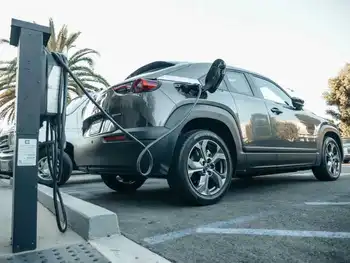Canada's Ambitious Electric Vehicle Goals

NFPA 70b Training - Electrical Maintenance
Our customized live online or in‑person group training can be delivered to your staff at your location.

- Live Online
- 12 hours Instructor-led
- Group Training Available
Canada 2035 Gasoline Car Ban accelerates EV adoption, zero-emission transport, and climate action, with charging infrastructure, rebates, and industry investment supporting net-zero goals while addressing affordability, range anxiety, and consumer acceptance nationwide.
Key Points
A federal policy to end new gas car sales by 2035, boosting EV adoption, emissions goals, and charging infrastructure.
✅ Ends new gas car and light-truck sales by 2035
✅ Expands charging infrastructure and grid readiness
✅ Incentives, rebates, and industry investment drive adoption
Canada has set its sights on a bold and transformative goal: to ban the sale of new gasoline-powered passenger cars and light-duty trucks by the year 2035. This ambitious target, announced by the federal government, underscores Canada's commitment to combating climate change and accelerating the adoption of electric vehicles (EVs) nationwide, supported by forthcoming EV sales regulations from Ottawa.
The Federal Initiative
Under the leadership of Prime Minister Justin Trudeau, Canada aims to significantly reduce greenhouse gas emissions from the transportation sector, which accounts for a substantial portion of the country's carbon footprint. The initiative aligns with Canada's broader climate objectives, including achieving net-zero emissions by 2050.
Driving Forces Behind the Decision
The decision to phase out internal combustion engine vehicles reflects growing recognition of the urgency to transition towards cleaner transportation alternatives, even as 2019 electricity from fossil fuels still powered a notable share of Canada's grid. Minister of Environment and Climate Change Jonathan Wilkinson emphasizes the environmental benefits of electric vehicles, citing their potential to lower emissions and improve air quality in urban centers across the country.
Challenges and Opportunities
While the move towards electric vehicles presents promising opportunities for reducing emissions, it also poses challenges. Key considerations include infrastructure development, affordability, and consumer acceptance of EV technology, amid EV shortages and wait times that can influence buying decisions. Addressing these hurdles will require coordinated efforts from government, industry stakeholders, and consumers alike.
Industry Response
The automotive industry plays a crucial role in realizing Canada's EV ambitions. Automakers are increasingly investing in electric vehicle production and innovation to meet evolving consumer demand and regulatory requirements, including cross-border Canada-U.S. collaboration on supply chains. The transition offers opportunities for job creation, technological advancement, and economic growth in the clean energy sector.
Provincial Perspectives
Provinces across Canada are pivotal in facilitating the transition to electric vehicles. Some provinces have already implemented incentives such as rebates for EV purchases, charging infrastructure investments, and policy frameworks to support emissions reduction targets, even as Quebec's EV dominance push faces scrutiny from experts. Collaborative efforts between federal and provincial governments are essential in ensuring a cohesive approach to achieving national EV goals.
Consumer Considerations
For consumers, the shift towards electric vehicles represents a paradigm shift in transportation choices. Factors such as range anxiety, charging infrastructure availability, and upfront costs, with one EV cost survey citing price as the main barrier, remain considerations for prospective buyers. Government incentives and subsidies aim to alleviate some of these concerns and promote widespread EV adoption.
Looking Ahead
As Canada navigates towards a future without gasoline-powered vehicles, stakeholders must work together to overcome challenges and capitalize on opportunities presented by the electric vehicle revolution, even as critics of the 2035 mandate question its feasibility. Continued investments in infrastructure, innovation, and consumer education will be critical in paving the way for a sustainable and prosperous automotive industry.
Conclusion
Canada's commitment to phasing out gasoline-powered vehicles by 2035 marks a pivotal moment in the country's climate action agenda. By embracing electric vehicles, Canada aims to lead by example in combatting climate change, fostering innovation, and building a greener future for generations to come. The success of this ambitious initiative hinges on collective efforts to transform the automotive landscape and accelerate towards a sustainable transportation future.











